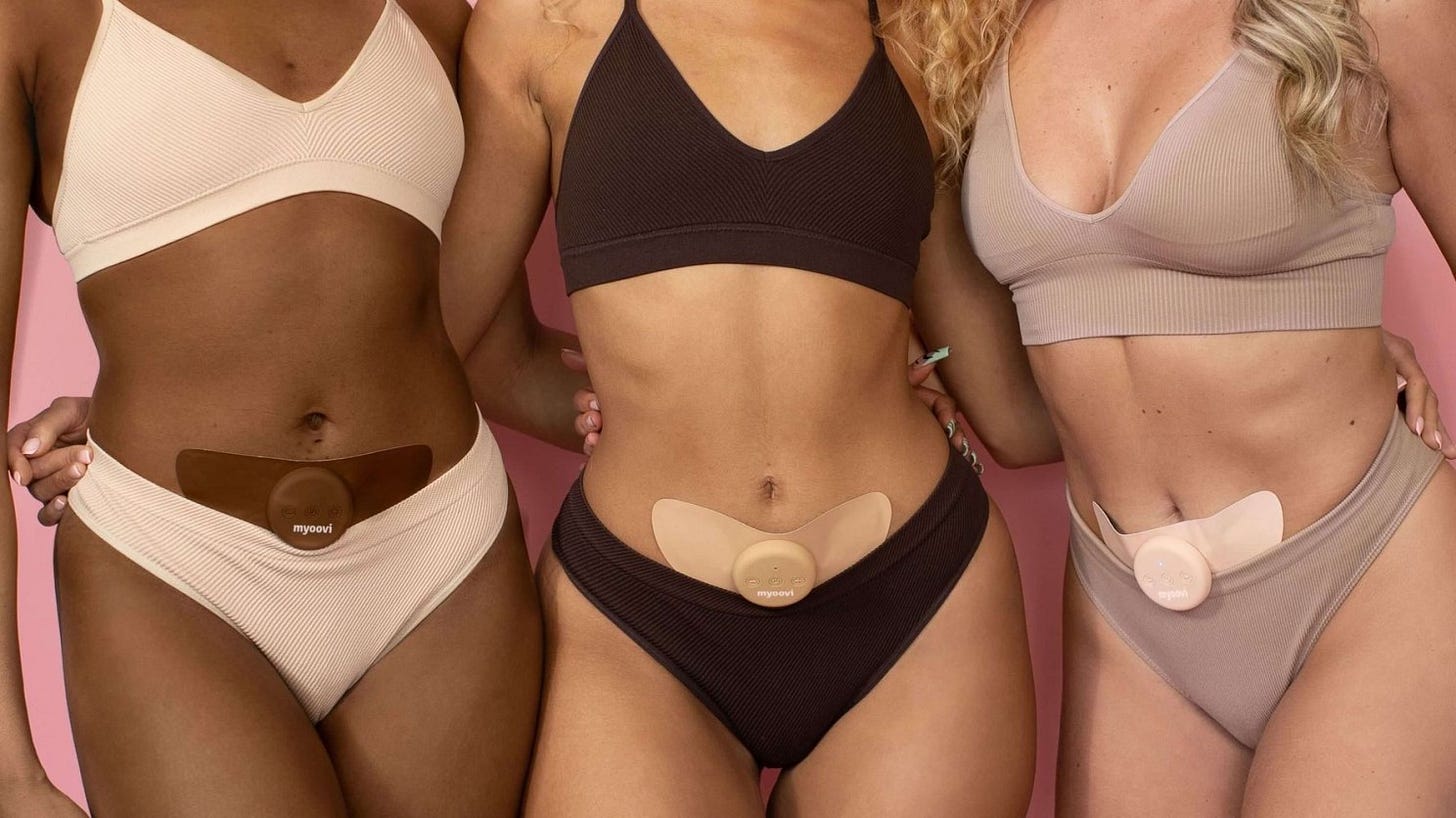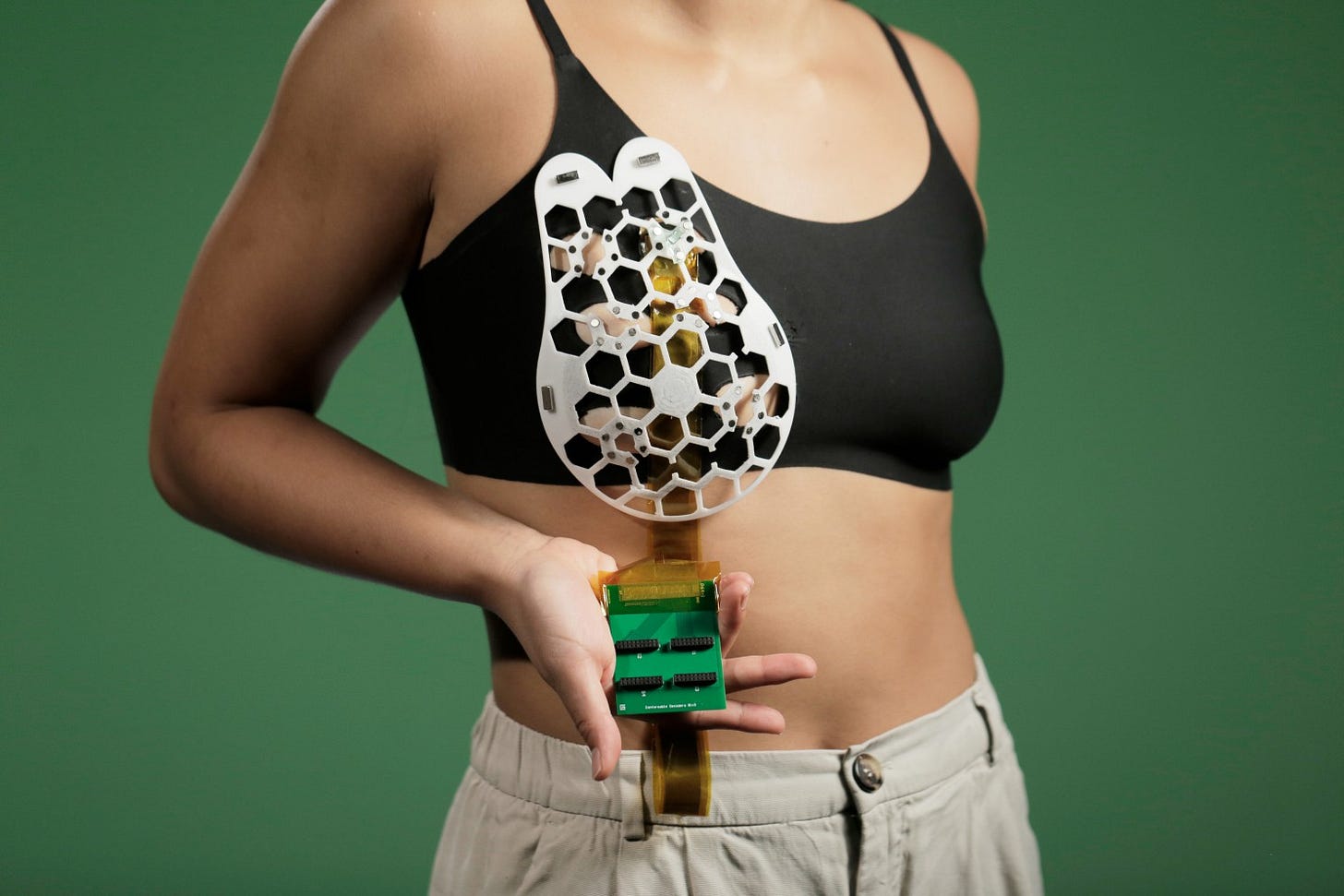Last month, we wrote about the changing nature of wearable tech, and how innovation was focussed on disrupting our most beloved medium (the screen) and sought to reframe the way we engaged with content in a screen-obsessed world. This month, we’re delving into the converse innovation of wearable technology, and how it’s emerged as both a beacon of hope and a dystopian future in the realm of healthcare, specifically in underrepresented areas of research: women’s health, well-being, and mental health. A myriad of health technologies, specifically designed with women in mind, have cropped up across the internet. From GPS tracking for safety, to devices to mitigate period pains, and early-detection of breast cancer.
This paradigm shift challenges the traditional ‘tech-bro’ culture of wearables, because in my opinion, it’s way more optimistic to read about devices that do actual societal good instead of egotistical vanity projects fixated on a more toxic idea of self-optimisation. How can it be bad? Offering promising solutions to longstanding health problems, often under-researched or overlooked by a strained medical institution could help an unimaginable amount of people suffering from chronic health problems that often get overlooked. That being said, amidst the optimism, there is a complex controversy: is wearable technology ascribing healthcare accessibility to just the individuals who can afford it, or is it helping to empower marginalised communities amidst medical bias?
Amid the complexities, femtech or wearable tech designed for women (which is a generalised description I understand, as the idea of tech being designed for a fixed idea of gender in mind gets a little... murky) can be seen as a beacon of progress, bridging critical gaps in women’s healthcare. For example, the Myoovi Period Pain Relief Device, which helps people suffering from unusually painful or just downright uncomfortable cramping. The development in personal ultrasound devices signifies a shift towards proactive healthcare. These innovations not only empower individuals to take charge of their health but also address longstanding disparities in healthcare provision.
Moreover, femtech shines a light on underrepresented healthcare areas, particularly those pertaining to women's unique biological experiences. The development of wearable cooling devices for menopausal symptoms and smart earrings for tracking ovulation and menstrual cycles exemplify the inclusivity and innovation inherent in femtech.
While innovation in FemTech holds promise, it simultaneously casts a slightly dystopian shadow, echoing broader societal inequalities. The emergence of devices like Happy Ring, which ‘combines proprietary, next-gen biometric sensors and generative AI to deliver personalised medical insights,’ is an example of this personalised healthcare with on-demand access, while still being extremely unaffordable to the everyday person. As these devices allow users, especially those whose health issues get overlooked by medical professionals (like getting told to just ‘deal’ with an extremely painful period cramp), to take control of their own symptoms, what exactly would this mean for those who couldn’t afford it? Does this divert the responsibility of care to the individual rather than the provider? Do I really want AI to access my medical health, is it any different than a doctor? It all feels complicated, and in a landscape where healthcare systems can falter under financial strain and constraints, the emphasis on individual agency can seem both empowering and oppressive. The narrative of personal responsibility can risk obscuring systemic failures and contribute to perpetrating disparities in healthcare access.
Is wearable technology ascribing healthcare accessibility to just the individuals who can afford it, or is it helping to empower marginalised communities amidst medical bias?
It also can seem a bit ‘pink-washed’ for my liking. There’s a certain girlboss ‘je ne sais quoi’ to all of this. I truly think the creation of fem tech helps empower people who feel ignored by their healthcare providers, or at least whose healthcare providers don’t have enough time in the day for. Period cramps with conditions like endometriosis and PCOS are no joke, they’re debilitating. Early screenings for cancers are hard to access, and it can be difficult to get seen (especially when your early symptoms don’t seem necessarily out of the ordinary). The resources for parents suffering from postpartum depression are extremely limited. It all feels impossible without external help, but sometimes the products, when capital is invested, make it feel girlbossy. The commodification of health, and the ascribing of individual responsibility being branded as the must have product feels a bit icky, but conversely it does alleviate real life pain overlooked by medical institutions. I’m not the one to say whether it’s good or not, I don’t know how to feel!
Furthermore, the pervasive nature of wearable health tracking introduces concerns of obsession and over-reliance on technology. The compulsion to monitor every aspect of one's physical and mental well-being, fuelled by ‘science-backed’ claims, underscores the fine line between empowerment and obsession. The 24/7 accessibility to personal health data can be overwhelming, raising questions about the balance between autonomy and technological determinism.
Addressing these challenges requires a collaborative approach that acknowledges the intersectionality of health disparities and technology's role in exacerbating or mitigating them. FemTech must not operate in isolation but rather in tangent with existing healthcare systems to ensure equitable access for all. By fostering partnerships between technology innovators, healthcare providers, and policymakers, FemTech can realise its full potential as a force for positive change. Amid the optimism, it is essential to navigate the complex controversies surrounding individual responsibility, healthcare accessibility, and inclusivity. By addressing these challenges through collaboration and innovation, FemTech has the potential to revolutionise healthcare delivery and empower marginalised groups worldwide.





